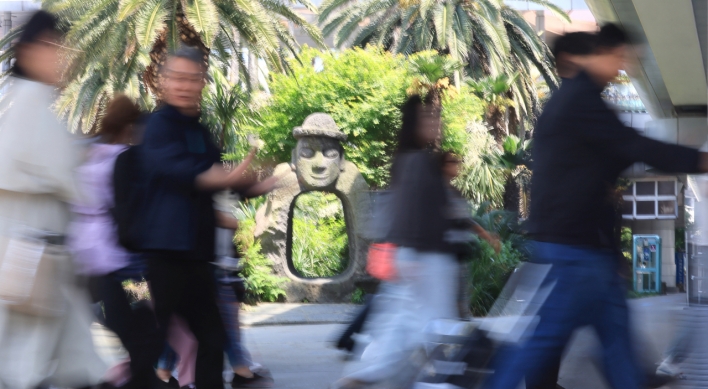Cutting off access to hard currency best way to end N. Korean nukes: U.S. lawmaker
By 정주원Published : Feb. 18, 2014 - 15:11
Cutting off North Korea's access to hard currency is the best strategy to slow down the communist country's nuclear weapons development, a visiting U.S. Republican lawmaker said Tuesday.
Ed Royce, the chairman of the U.S. House Committee on Foreign Affairs, also said the recent United Nations' report accusing the North Korean regime of severe human rights violations will add pressure on Pyongyang to give up its nuclear weapons program.
"It seems that the strategy that slows down North Korea the most is not allowing them access to the hard currency which they use in order to create their offensive nuclear weapons capabilities," said Royce in an interview with Yonhap News Agency in Seoul.
Royce is now in Seoul along with a delegation from his foreign affairs committee. He met with President Park Geun-hye and Foreign Minister Yun Byung-se earlier in the day.
"We have tried various strategies and at this point, one of the problems is that if we give any additional support to the regime of North Korea, for example, we were to give them inducement in the form of currency, they would use that hard currency to further expand their nuclear weapons capabilities," the lawmaker said.
Royce's remarks represent the harder line of U.S. efforts to remove the North Korean weapons program, compared to those who prefer dialogue in solving the issue.
Countries involved in six-party talks aimed at ending North Korea's nuclear ambitions are revving up efforts to revive the long-stalled talks. Pyongyang's third nuclear bomb test last February boosted concerns about their increasing nuclear weapons capabilities, prompting China to embark on the efforts to resume the multilateral disarmament forum involving the two Koreas, the U.S., China, Japan and Russia.
Seoul and Washington have shown reservations about a resumption, however, saying Pyongyang should take concrete steps in the direction of denuclearization before the talks can resume.
Royce also said the new United Nations report on the North Korean regime's brutal human rights violations may help add pressure on Pyongyang to give up its nuclear program and may possibly make North Korean leader Kim Jong-un stand trial on crimes against humanity in the International Criminal Court (ICC).
Wrapping up a year-long investigation, the U.N. Committee of Inquiry on the North Korean human rights situation released the report on Monday, accusing Kim and the North Korean leadership of grave human rights violations and issued a recommendation that the case be referred to the international court for trial.
"Perhaps there will be new opportunities (following the publication of the U.N. report) to have fresh pressure brought from governments such as Beijing on North Korea in order to try to slow its development of nuclear capabilities," the U.S. politician said.
"I think it will galvanize international public opinion with respect to the conditions inside North Korea and hopefully can push to put North Korea on a different track."
When the final report is submitted to the U.N. Human Rights Council on March 17, the international community could take actions to refer the North Korean leadership to the ICC, he said, adding, "I know there's much discussion of that at the U.N."
Touching on Pyongyang's string of rapprochement gestures, including an agreement with Seoul to hold inter-Korean reunions of families separated by the 1950-53 Korean War, Royce said that behind the peace gestures may be the North's "ulterior motives to try to get more aid."
The U.S. politician also urged Japan to stop nationalist moves, referring to the high-running Seoul-Tokyo tensions caused by a string of nationalist behaviors by the Shinzo Abe administration over territorial and history-related issues.
The icy bilateral relations have further soured after Abe visited the controversial Yasukuni shrine last December that honors Japan's World War II criminals along with other war dead. Japan's recurring claims to Dokdo, the easternmost South Korean islets, have also frayed ties.
"I have urged leaders in Japan to disavow hurtful comments about the past, and I think it's very important that all nations recognize the truth of what has happened in the past," Royce said.
"We should not allow the situation to create a division between democratic allies of the U.S.," he said, adding, "My hope is that by speaking out we can have an influence about what happens next." (Yonhap)








![[Weekender] Korean psyche untangled: Musok](http://res.heraldm.com/phpwas/restmb_idxmake.php?idx=644&simg=/content/image/2024/05/02/20240502050841_0.jpg&u=)








![[Eye Interview] 'If you live to 100, you might as well be happy,' says 88-year-old bestselling essayist](http://res.heraldm.com/phpwas/restmb_idxmake.php?idx=652&simg=/content/image/2024/05/03/20240503050674_0.jpg&u=)
